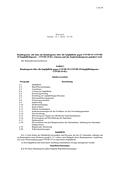On Sunday, the federal government presented the final draft for the general compulsory vaccination planned from February 2022. The obligation to vaccinate should apply to all persons residing in Austria from the age of 18. Exceptions are made for pregnant women and those who cannot be vaccinated for health reasons, as well as for those who have recovered (for 180 days). The range of penalties is between 600 and 3,600 euros, and there will be controls from mid-March. Each person may be penalized a maximum of four times. The law was designed to be as flexible as possible and can be amended and even repealed by ordinance. A control commission monitors the execution of the compulsory vaccination. The National Council decision should be made on Thursday.
The following is an overview of the cornerstones of the planned general obligation to vaccinate:
For whom does the obligation to vaccinate apply?
All persons over the age of 18 who have their main or secondary residence in Austria are affected by the obligation to vaccinate. You must have a immunization status that includes all immunizations as determined by regulation from the Minister of Health (recommended by the National Immunization Board). Currently, this would include both the first and second vaccination as well as the further vaccinations (“boosters”). The interval between immunizations must also be specified by regulation.
What exceptions are there?
In addition to children and young people under the age of 18, pregnant women (for the duration of pregnancy) and people who cannot be vaccinated for medical reasons are exempt from the obligation to vaccinate. This can be allergies, organ transplants, stem cell transplants or autoimmune diseases. An exception reason is not limited to physical health. In individual extreme cases, an exception can be made in the presence of an anxiety disorder that poses a threat to life or health.
A corresponding decision may be issued by technically suitable outpatient departments of hospitals, public health officers and epidemic doctors and not, as originally planned, family doctors and psychiatrists.
The reason for the exception must be confirmed by means of a medical certificate. In the case of pregnant women and people who cannot be vaccinated for health reasons, the doctor must enter the reason for the exception in the central vaccination register. The exemption is valid until the end of the month following the end of the reason for the exemption.
There are also exceptions for those who have recovered – for 180 days from the day of the positive test. People who have recovered can prove their reason for exception with a proof of recovery or a certificate of recovery. However, the recovery is not to be entered in the central vaccination register.
How is the introduction going?
The vaccination requirement will be introduced in three phases. From the beginning of February, every household will be informed in writing about the measure. From March 16, compulsory vaccination will become a control offence. The checks are carried out everywhere, for example on the road. If someone is caught who has not been vaccinated, they can expect to be reported from this point on.
Should it be epidemiologically necessary, the third phase will come into force after a certain period of time. Then unvaccinated people are assigned a vaccination appointment, if they do not comply with this, they are issued automated vaccination penalties (after a reminder).
What are the penalties?
Anyone who does not have a vaccination status at a check must expect penalties. In a “proper procedure” the penalty is up to 3,600 euros. Alternatively, a so-called “abbreviated procedure” can also be carried out. Penalties of up to 600 euros are provided for here. If this amount is then not paid in or if an objection is raised against the penal order, proper proceedings will be initiated. Each person may be penalized a maximum of four times.
According to the Ministry of Health, if you receive a penalty order, you can still avert the penalty by getting vaccinated – as long as the procedure is still ongoing. In the context of a so-called “active repentance” one can vaccinate oneself out of punishment. There are also penalties for doctors who issue a false exceptional certificate – up to 7,200 euros.
It is expressly made clear in the law that the vaccination may not be enforced with direct coercion. There will be no jail terms and no flex penalties.
How long is vaccination compulsory?
According to the law, the vaccination requirement will expire on January 31, 2024.
Download to the article


Draft legislation on compulsory vaccination
PDF file from 01/16/2022 (466.08 KBytes.)
Open PDF
Source: Nachrichten




